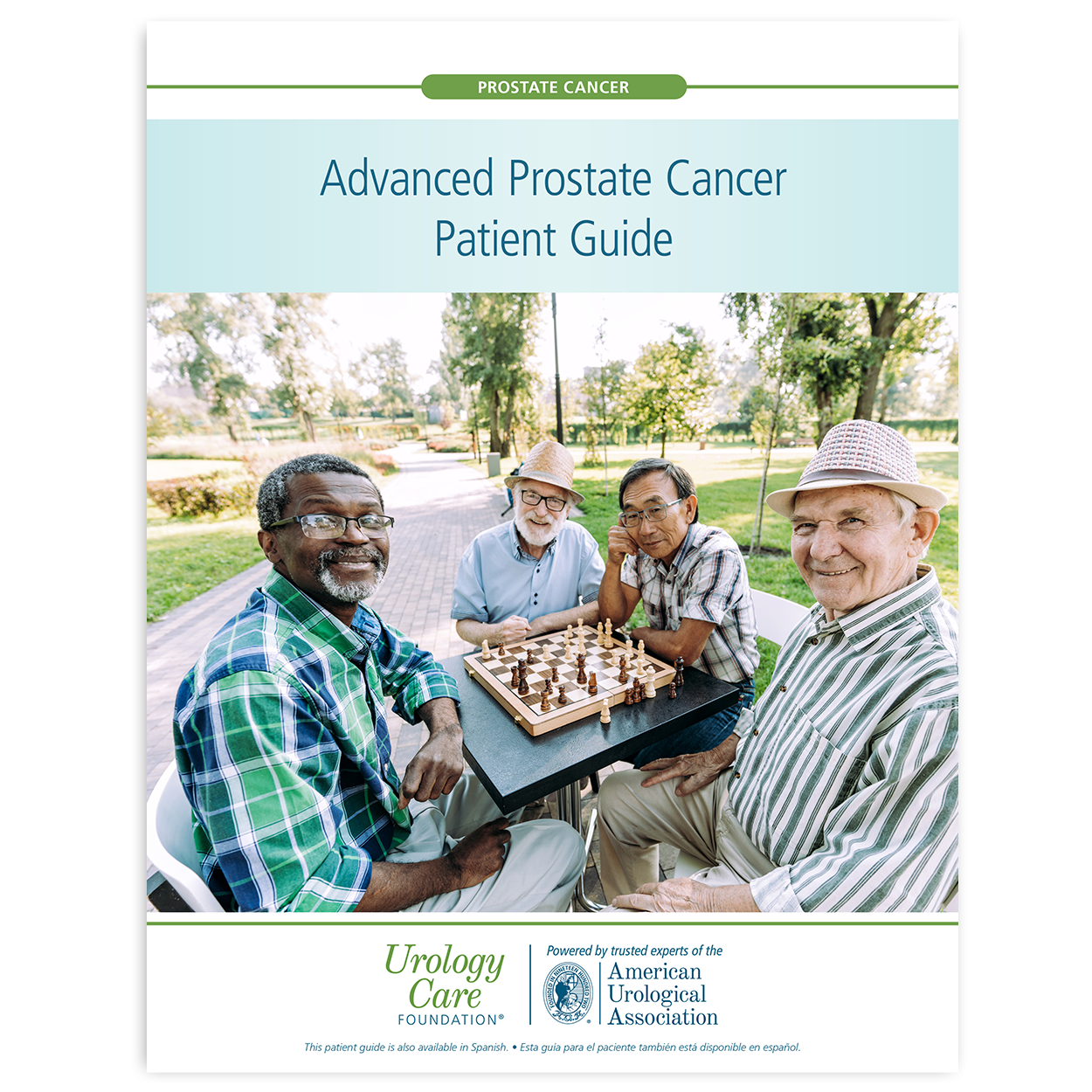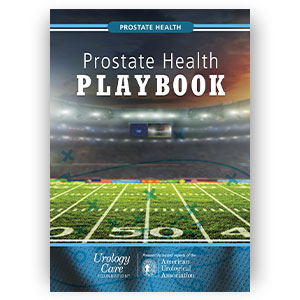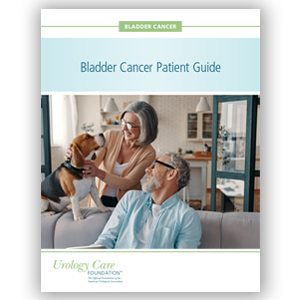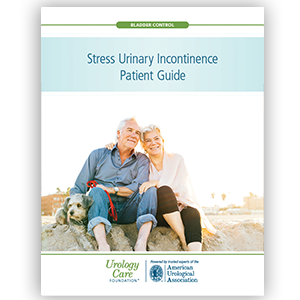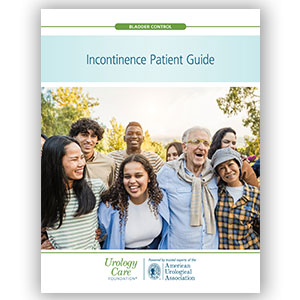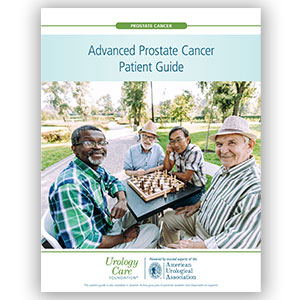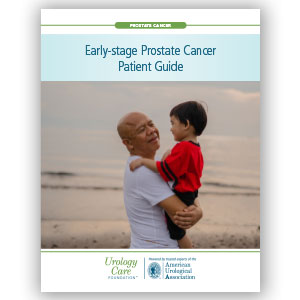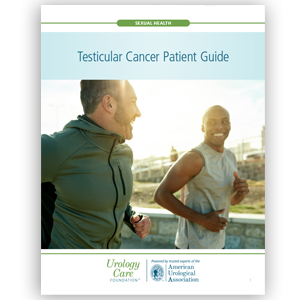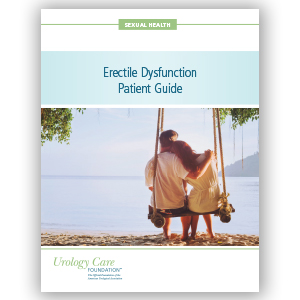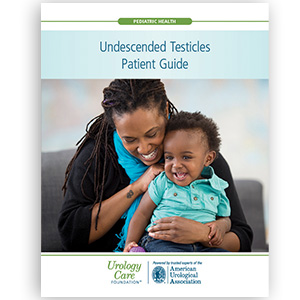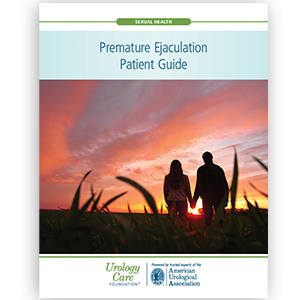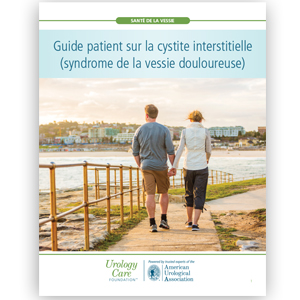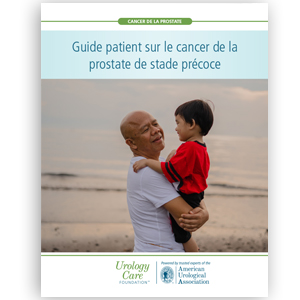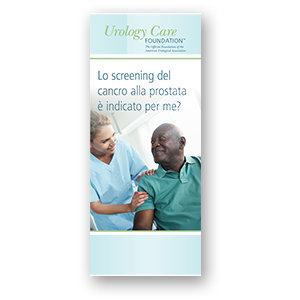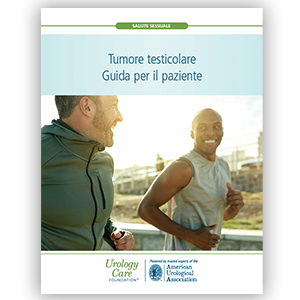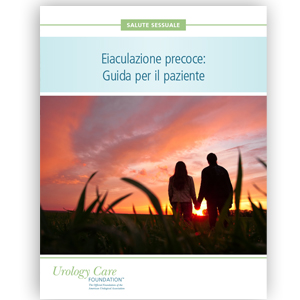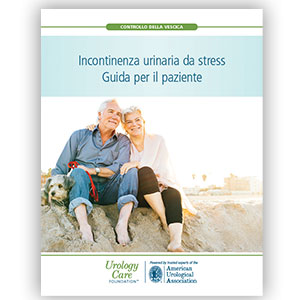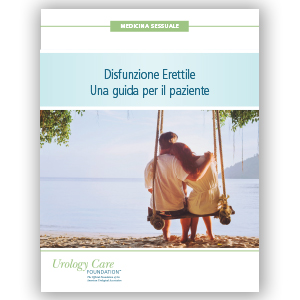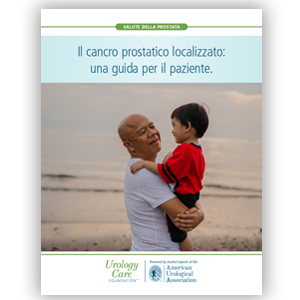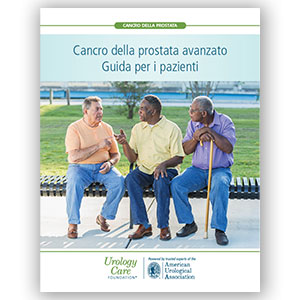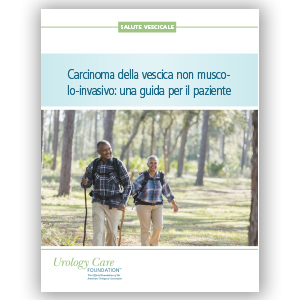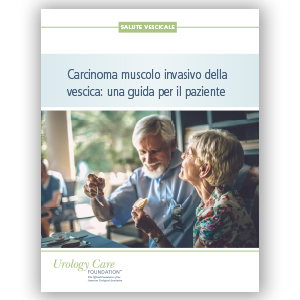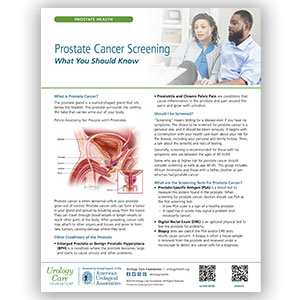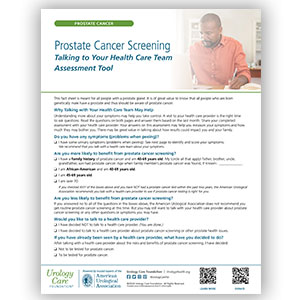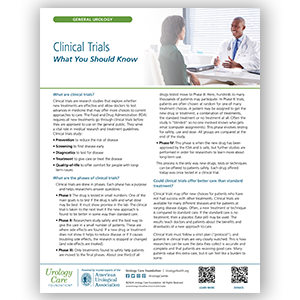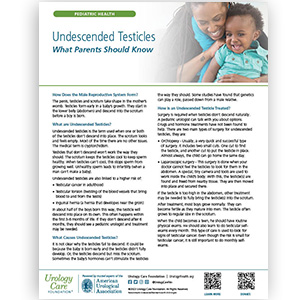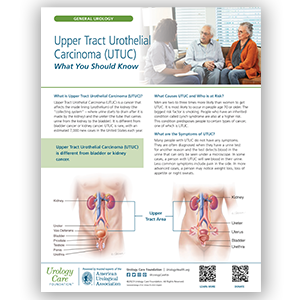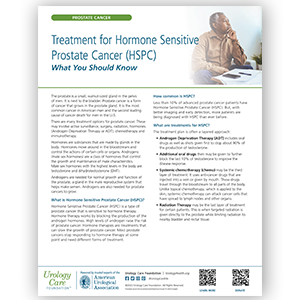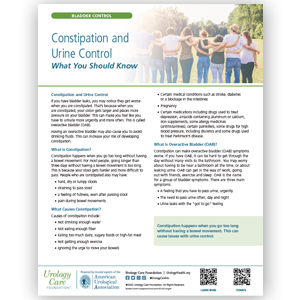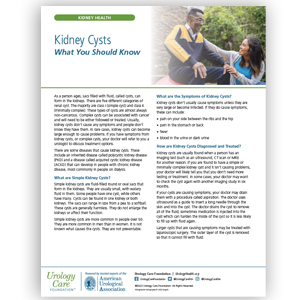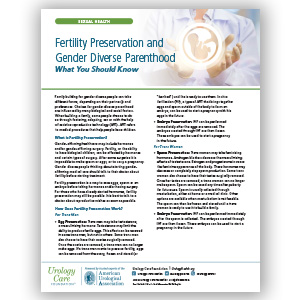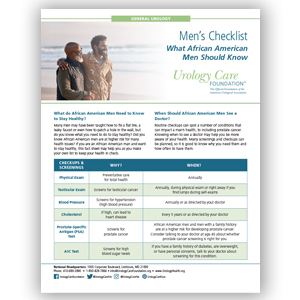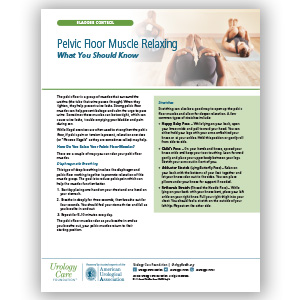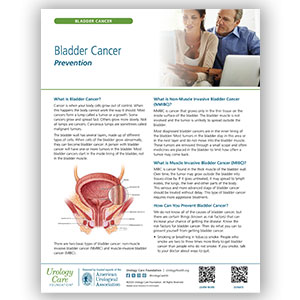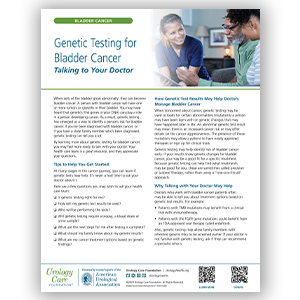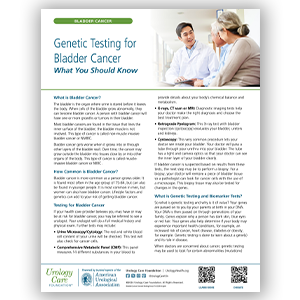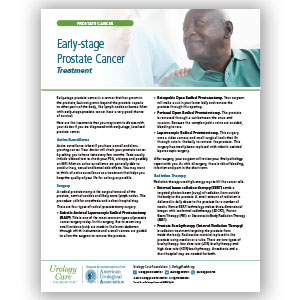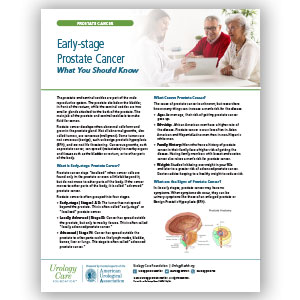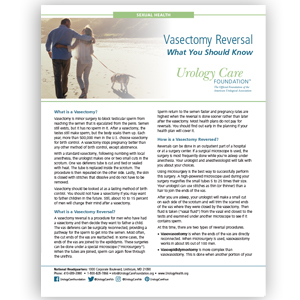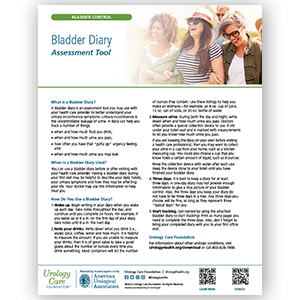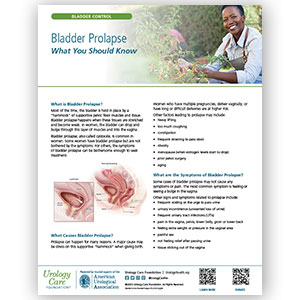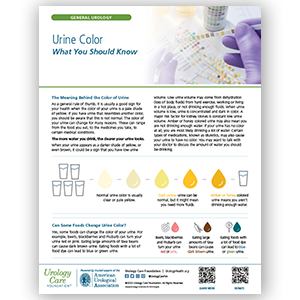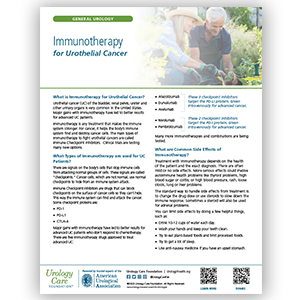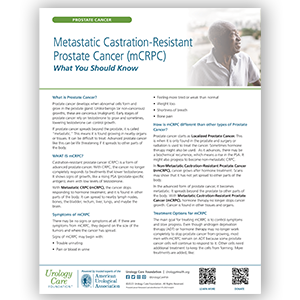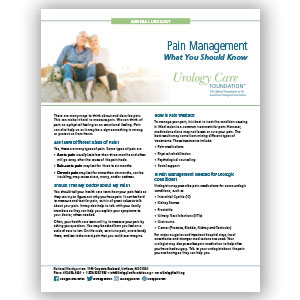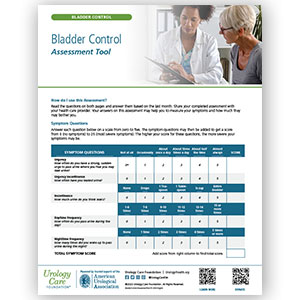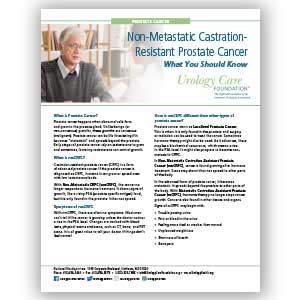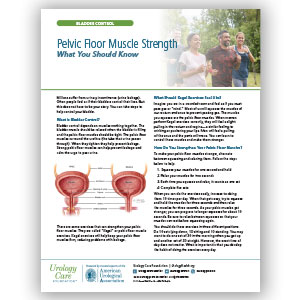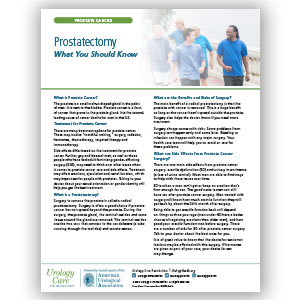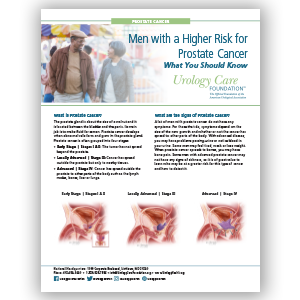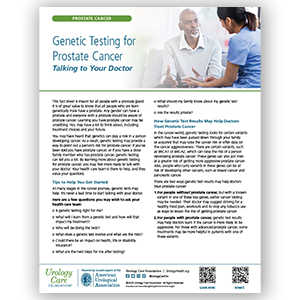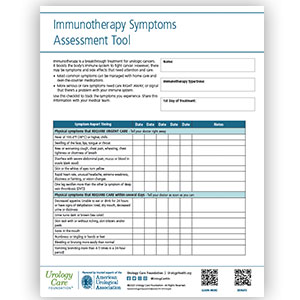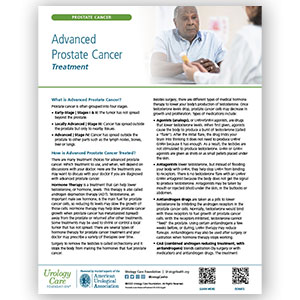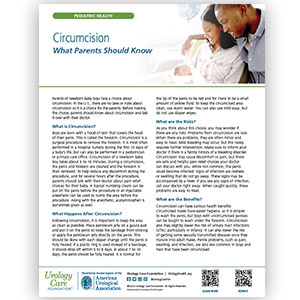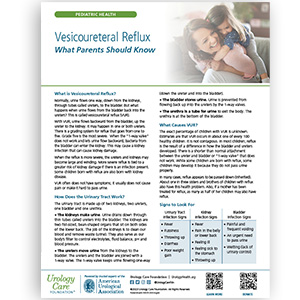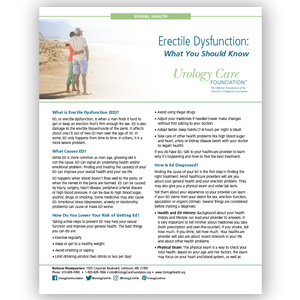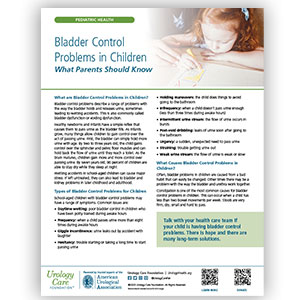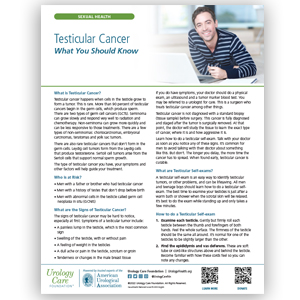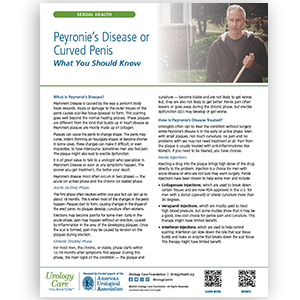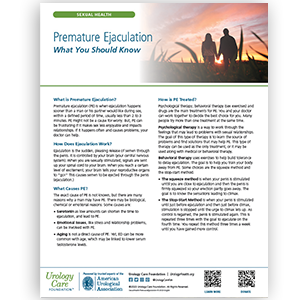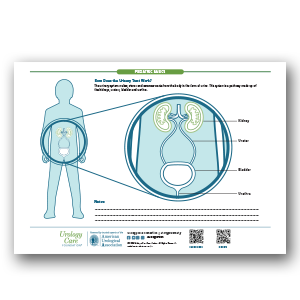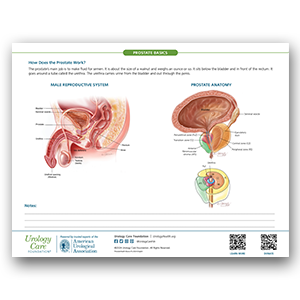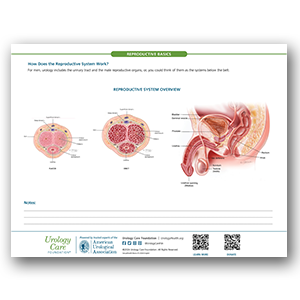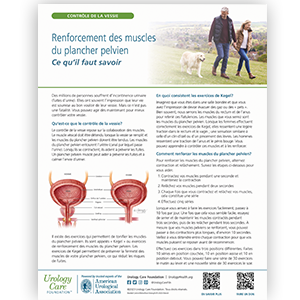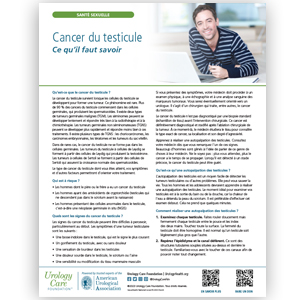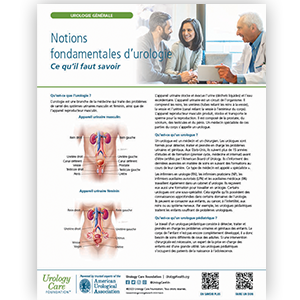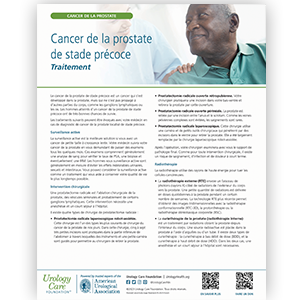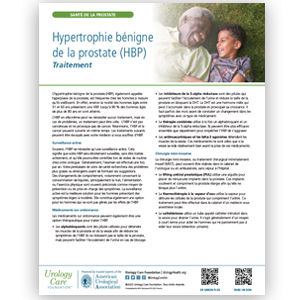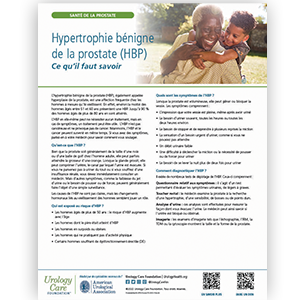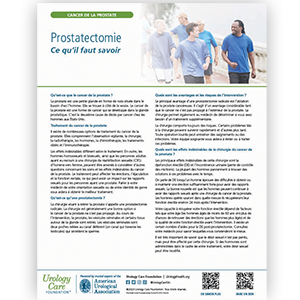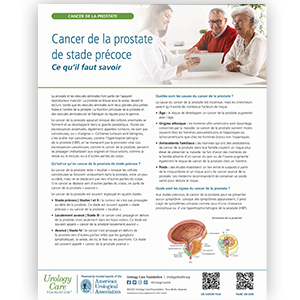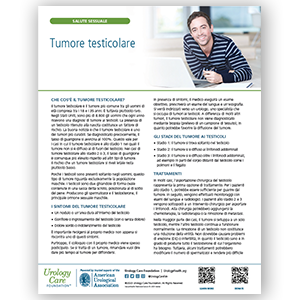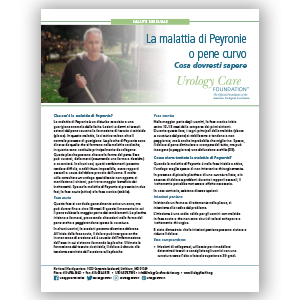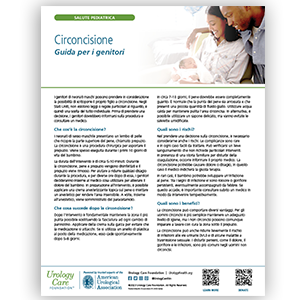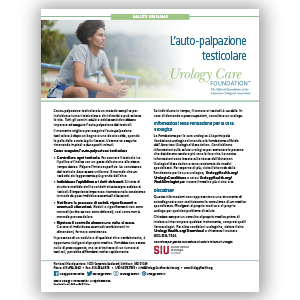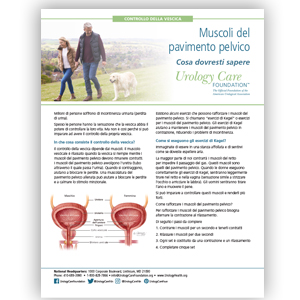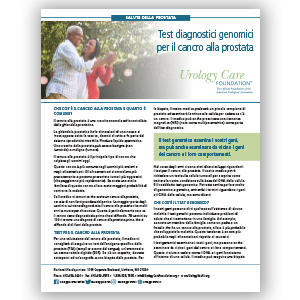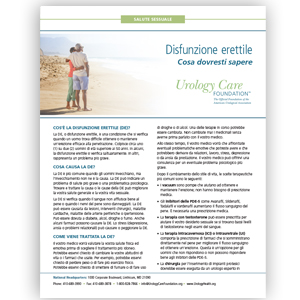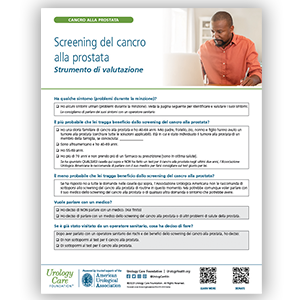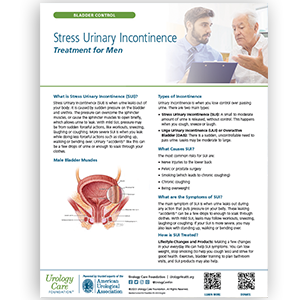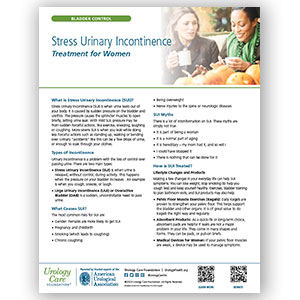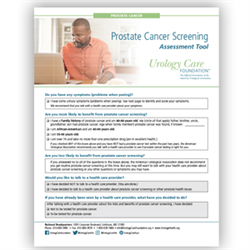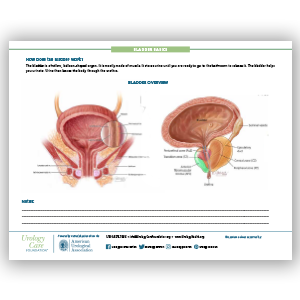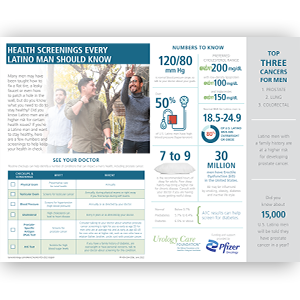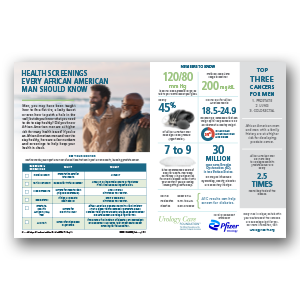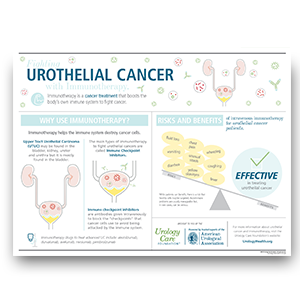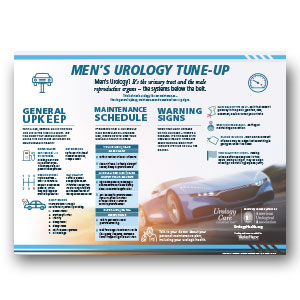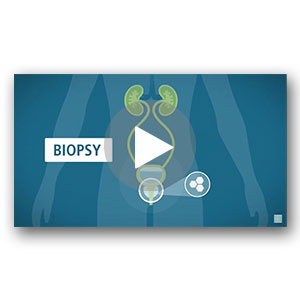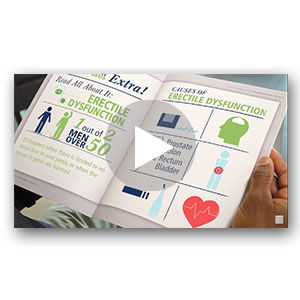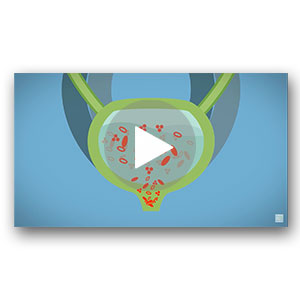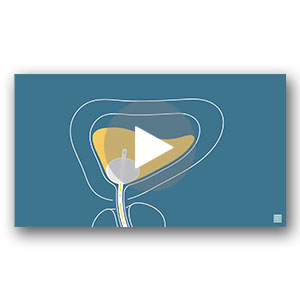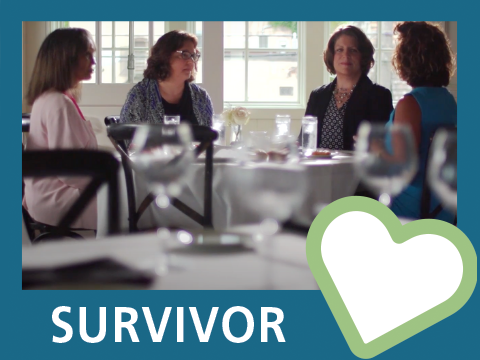Advanced Prostate Cancer
Order available (US ONLY). In this patient guide, patients are provided with information about advanced prostate cancer to help during their prostate cancer journey. Content includes how to diagnose, screen, treat and manage advanced prostate cancer, including a patient perspective.… more
Prostate Health Playbook
Order this football-themed prostate health resource covering prostatitis, BPH, incontinence as well as information on prostate cancer to include screening and treatment options.… more
Bladder Cancer Patient Guide
Guide with information about how to diagnose, treat and manage bladder cancer, including a patient perspective.… more
Living Healthy Cookbook with Information about Urologic Cancers
Part of managing cancer includes a healthy diet and lifestyle. This educational cookbook has recipes from celebrity chefs and is designed to help those affected by urologic cancers.… more
Living Healthy Cookbook with Information about Urologic Cancers
Part of managing cancer includes a healthy diet and lifestyle. This educational cookbook has recipes from celebrity chefs and is designed to help those affected by urologic cancers.… more
Stress Urinary Incontinence (SUI)
Download this patient resource on Stress Urinary Incontinence (SUI).… more
Early-stage Prostate Cancer
How to diagnose, screen, treat and manage early-stage prostate cancer, including a patient perspective.… more
Testicular Cancer Patient Guide
Detailed guide to include a patient story, symptoms, diagnosis and treatment for men as well as a section on children with testicular cancer.… more
Guide patient sur la cystite interstitielle (syndrome de la vessie douloureuse)
La cystite interstitielle (CI), ou syndrome de la vessie douloureuse (SVD), est un problème de douleur vésicale chronique. Cela peut évoquer une infection de la vessie ou infection urinaire, mais ce n’en est pas une. Il s’agit d’une sensation d’inconfort et de pression dans la région de la vessie qui dure six semaines ou plus, sans infection ni autre cause évidente. (Patient Guide to Interstitial Cystitis (Painful Bladder Syndrome))… more
Guide patient sur le cancer de la prostate de stade précoce
Le cancer de la prostate est la deuxième cause de décès par cancer chez les hommes aux États-Unis. La plupart des hommes ayant un diagnostic précoce peuvent vivre longtemps. Choisir son traitement peut être difficile. Informez-vous et posez des questions afin de faire le choix qui vous conviendra le mieux. (Early-stage Prostate Cancer Patient Guide)… more
Lo screening del cancro alla prostata è indicato per me? Opuscolo
Un opuscolo pieghevole a tre falde che analizza il cancro alla prostata e i relativi rischi e fornisce informazioni sullo screening del cancro. (Is Prostate Cancer Screening Right for Me? Brochure)… more
Terapia con testosterone: una guida per il paziente
Una guida dettagliata su testosterone, sintomi da scarso testosterone, cause, diagnosi e opzioni di trattamento. (Testosterone Therapy Patient Guide)… more
Cancro del testicolo - Guida per il paziente
Una guida dettagliata che include storia del paziente, sintomi, diagnosi e trattamento negli uomini, oltre a una sezione dedicata ai bambini colpiti da cancro del testicolo. (Testicular Cancer Patient Guide)… more
Eiaculazione precoce
Una spiegazione dettagliata dell’eiaculazione, oltre che delle cause, della diagnosi, del trattamento e della prevenzione dell’eiaculazione precoce.… more
Incontinenza urinaria da stress (SUI) - Guida per il paziente
Come diagnosticare, trattare e gestire la SUI, con inclusa la prospettiva del paziente. (Stress Urinary Incontinence Patient Guide)… more
Incontinenza - Guida per il paziente
Vengono presentate modalità per gestire questa condizione valide per uomini e donne.… more
Vescica iperattiva (OAB) - Guida per il paziente
Questa guida multipagina include risorse sull’OAB per aiutare i pazienti che ne sono affetti.… more
Cancro prostatico localizzato: una guida per il paziente.
Modalità di diagnosi, screening, trattamento e gestione del cancro prostatico localizzato; è compresa una prospettiva del paziente. (Early-stage Prostate Cancer Patient Guide)… more
UrologyHealth extra® – Bladder Cancer Special Issue
Order this special issue focusing on bladder cancer to be shipped free in the United States and includes information for patients and caregivers on the basics such as the stages of this cancer, symptoms, treatments, risk factors and how to learn more.… more
UrologyHealth extra® – Bladder Cancer Special Issue
Download this special issue focusing on bladder cancer that includes information for patients and caregivers on the basics such as the stages of this cancer, symptoms, treatments, risk factors and how to learn more.… more
UrologyHealth extra® – Navigating Prostate Cancer
Download this special issue focusing on prostate cancer that includes information for patients and caregivers on risk factors, healthy living tips and more.… more
UrologyHealth extra – Navigating Prostate Cancer
Order this special issue focusing on prostate cancer that includes information for patients and caregivers on risk factors, healthy living tips and more.… more
Prostate Cancer Screening What You Should Know
Order this patient-friendly prostate cancer screening fact sheet to be shipped free in the United States. This fact sheet is used to aid in decision making about prostate cancer screening.… more
Prostate Cancer Screening Talking to Your Health Care Team Assessment Tool
Download this free patient-friendly screening assessment tool designed to self-assess symptoms to help guide conversations with your health care team about prostate cancer screening. … more
Prostate Cancer Screening What You Should Know
Download this free patient-friendly fact sheet to aid in decision making about prostate cancer screening.… more
Clinical Trials - What You Should Know Fact Sheet
Order this fact sheet to learn about clinical trials, include details about phases, benefits, privacy rights, fees and resources to learn more.… more
Clinical Trials - What You Should Know Fact Sheet
Download this fact sheet to learn about clinical trials, include details about phases, benefits, privacy rights, fees and resources to learn more.… more
Women’s Health and Menopause – What You Should Know Fact Sheet
Learn about women’s health during perimenopause and menopause, symptoms and treatment options. … more
Women’s Health and Menopause – What You Should Know Fact Sheet
Order this fact sheet that includes information on perimenopause, menopause, symptoms and treatment options for women.… more
Men’s Checklist What Latino Men Should Know Fact Sheet
Did you know Latino men are at higher risk for many health issues? This free fact sheet includes numbers and screenings to help Latino men keep their health in check.… more
Treatment Intensification for Hormone Sensitive Prostate Cancer (HSPC) - Talking to Your Doctor Fact Sheet
Learn about treatment intensification for Hormone Sensitive Prostate Cancer and questions to ask your doctor.… more
Upper Tract Urothelial Carcinoma (UTUC) - What You Should Know
Order this fact sheet to be shipped free in the United States to learn about Upper Tract Urothelial Carcinoma (UTUC), types, symptoms, treatment and more.… more
Upper Tract Urothelial Carcinoma (UTUC) - What You Should Know
Download this fact sheet to learn about Upper Tract Urothelial Carcinoma (UTUC), types, symptoms, treatment and more.… more
Treatment for Hormone Sensitive Prostate Cancer (HSPC) - What You Should Know Fact Sheet
Learn about Hormone Sensitive Prostate Cancer, common treatments and what to expect after treatment.… more
Constipation and Urine Control - What You Should Know Fact Sheet
This fact sheet outlines what to know about constipation and urine control. Constipation happens when you go too long without having a bowel movement & this can cause issues with urine control. … more
Constipation and Urine Control: What You Should Know
Order this fact sheet that outlines what to know about constipation and urine control. Constipation happens when you go too long without having a bowel movement & this can cause issues with urine control. … more
Ureteropelvic Junction (UPJ) Obstruction - What Parents Should Know Fact Sheet
Learn about Ureteropelvic Junction (UPJ) Obstruction, its causes, symptoms and common treatments.… more
Androgen Deprivation Therapy (ADT) - Talking to Your Doctor Fact Sheet
Learn about how to talk to your doctor Androgen Deprivation Therapy (ADT) for prostate cancer.… more
Androgen Deprivation Therapy (ADT) – What You Should Know Fact Sheet
Learn about Androgen Deprivation Therapy (ADT) for prostate cancer, who should receive ADT, how is ADT given and the benefits, risks and side effects of ADT. … more
Kidney Cysts - What You Should Know Fact Sheet
As a person ages, sacs filled with fluid, called cysts, can form in the kidneys. This fact sheet outlines what you should know about kidney cysts.… more
Bladder Exstrophy – What Parents Should Know Fact Sheet
Bladder exstrophy is a rare birth defect. On average, it occurs in about 1 out of every 50,000 live births. It is slightly more common in males than females. It is a condition where the bladder and parts around it form inside-out. … more
Women’s Urology – What You Should Know Fact Sheet
Women often put the health of their families ahead of their own. It is of great value to take care of your own health, including your urologic health. There are many things you can do to prevent urologic conditions such as kidney stones and urinary tract infections (UTIs). Here are some healthy living tips that can improve your urologic health.… more
Adult Gender: What You Should Know
Learn about adult gender, gender affirmation and terms around gender.… more
Fertility Preservation and Gender Diverse Parenthood: What You Should Know
Learn about fertility preservation for gender diverse adults and frequently asked questions.… more
Adult Sexuality and Gender Diversity: What You Should Know
Learn about adult sexuality and gender diversity, sexual orientation, gender dysphoria and medical choices for gender diverse adults.… more
Adult Masculinizing Gender-Affirming Surgery: What You Should Know
Learn about gender affirmation, adult masculinizing gender-affirming surgery and questions to ask your doctor.… more
Adult Feminizing Gender-Affirming Surgery: What You Should Know
Learn about gender affirmation, adult feminizing gender-affirming surgery and questions to ask your doctor.… more
Bladder Cancer: What You Should Know
Learn more about the basics of bladder cancer including types, causes, symptoms, testing and treatment options. … more
Men’s Checklist What African American Men Should Know
Did you know African American men are at higher risk for many health issues? This free fact sheet includes numbers and screenings to help African American men keep their health in check. … more
Salvage Radiation Therapy for Prostate Cancer
Learn about salvage radiation therapy (SRT) as a type of cancer treatment given to men who had their prostate removed yet their prostate-specific antigen (PSA) levels begin to rise.… more
Genomic Diagnostic Testing for Prostate Cancer
Learn about genomic testing and how it may impact prostate cancer.… more
Pelvic Floor Muscle Relaxing: What You Should Know
Strong pelvic floor muscles can help prevent leakage and calm the urge to pass urine. Sometimes these muscles can be too tight, which can cause urine leaks, trouble emptying your bladder and pain during sex.… more
Advanced Prostate Cancer – What You Should Know
A review of advanced prostate cancer to include its stages and risk factors.… more
Genetic Testing for Bladder Cancer – Talking to Your Doctor
Learn more about genetic testing for bladder cancer and how to prepare as a way to feel more ready to talk with your doctor.… more
Genetic Testing for Bladder Cancer - What You Should Know
A description about genetic testing for bladder cancer and how genetic test results may help patients make informed choices.… more
Treatment for Early-Stage Prostate Cancer
This fact sheet covers the treatments you may want to discuss with your doctor if you are diagnosed with early-stage, localized prostate cancer.… more
Early-Stage Prostate Cancer: What You Should Know
Learn more about Early-Stage Prostate Cancer using this fact sheet.… more
Vasectomy Reversal
Download this fact sheet with information about vasectomy reversal. Vasectomy reversal is a procedure for men who have had a vasectomy and then decide they want to father a child.… more
Bladder Diary Assessment Tool
Use this bladder diary assessment tool and share the results with your healthcare provider to get a better understanding of your urinary incontinence symptoms. … more
Bladder Diary Assessment Tool
Use this bladder diary assessment tool and share the results with your healthcare provider to get a better understanding of your urinary incontinence symptoms. … more
Bladder Prolapse - What You Should Know
An overview of bladder prolapse causes, symptoms, diagnosis and treatment options.… more
Urine Color - What You Should Know
A fact sheet about the meaning behind the color of urine for people of all ages to know when to drink more, what can change urine color and when to talk with a doctor about urine color.… more
Metastatic Hormone-Sensitive Prostate Cancer (mHSPC) - What You Should Know Fact Sheet
A concise summary about Metastatic Hormone-Sensitive Prostate Cancer to help patients understand this stage, to include treatment.… more
Telehealth - What You Should Know
A fact sheet on what patients should know about telehealth.… more
Immunotherapy for Urothelial Cancer Fact Sheet
Summary of immunotherapy for cancers of the bladder, renal pelvis, ureter and other urinary organs to include treatment, adverse reactions and questions to ask the health care team.… more
Hypospadias – What Parents Should Know
A short summary of Hypospadias, including signs, diagnosis, treatments and questions to ask your child’s doctor.… more
Varicoceles - What You Should Know
Designed for teen boys and men to explain this condition, causes, treatments and address frequently asked questions.… more
Metastatic Castration-Resistant Prostate Cancer (mCRPC) - What You Should Know Fact Sheet
A concise summary of Metastatic Castration –Resistant Prostate Cancer to help patients understand this stage of prostate cancer.… more
Bladder Control Assessment Tool
This Bladder Control assessment tool may help to measure symptoms and quality of life related to passing urine.… more
Non-Metastatic Castration-Resistant Prostate Cancer (nmCRPC) – What You Should Know
A concise summary of Non-metastatic Castration–Resistant Prostate Cancer to help patients understand this stage of prostate cancer.… more
Pelvic Floor Muscle Strength: What You Should Know
Download this fact sheet on how to perform Kegel exercises.… more
Overactive Bladder Assessment Tool
An assessment tool that allows patient to score symptoms and illustrates how they may be affecting their quality of life.… more
Overactive Bladder Diary
This Overactive Bladder Diary may help to record liquid intake, how often urine is passed and urine leakage to help you talk with your health care team.… more
Bladder Control Assessment Tool
This Bladder Control assessment tool may help to measure symptoms and quality of life related to passing urine. … more
Prostatectomy – What You Should Know Fact Sheet
A review of prostatectomy for prostate cancer treatment to include general information, benefits, risks and side effects. … more
Women’s Checklist What Black Women Should Know
Did you know Black women are at higher risk for many health issues? This free fact sheet includes numbers and screenings to help Black women keep their health in check. … more
Men with a Higher Risk for Prostate Cancer – What You Should Know
Learn about which men may have a higher risk for prostate cancer as well as about screening and treatment. … more
Genetic Testing for Prostate Cancer - What You Should Know
Learn about genetic testing and how it may impact prostate cancer.… more
Genetic Testing for Prostate Cancer – Talking to Your Doctor
At many stages in the cancer journey, genetic tests may help. This fact sheet may help prepare those impacted by prostate cancer to talk to the health care team.… more
Advanced Prostate Cancer Treatment
A review of advanced prostate cancer to include its stages and treatment options.… more
Neurogenic Bladder - What You Should Know Fact Sheet
A fact sheet that helps patients to understand when nerve damage causes bladder problems and how to manage the condition.… more
Pediatric Urology Basics
The basics about urinary function in children with notes section to help patients, parents and health care teams.… more
Prostate Basics
The basics about prostate function and prostate cancer with notes section to help patients and health care teams.… more
Reproductive Basics
The basics about reproductive function in men as well as penile and testicular cancer with notes section to help patients and health care teams. … more
L’énurésie chez l’enfant: Ce que les parents doivent savoir
Il est question d’énurésie nocturne lorsqu’un enfant urine involontairement pendant son sommeil. C’est ce qu’on appelle communément faire pipi au lit. Plus de cinq millions d’enfants aux États-Unis ont des problèmes d’énurésie. (Bedwetting – What Parents Should Know Fact Sheet)… more
Détente des muscles du plancher pelvien: Ce qu’il faut savoir
Un plancher pelvien musclé peut aider à prévenir les fuites et à calmer l’envie d’uriner. Parfois, ces muscles peuvent être trop tendus, ce qui peut entraîner des fuites urinaires, des difficultés à vider la vessie et des douleurs pendant les rapports sexuels. (Pelvic Floor Muscle Relaxing – What You Should Know Fact Sheet)… more
Renforcement des muscles du plancher pelvien: Ce qu’il faut savoir
Des millions de personnes souffrent d’incontinence urinaire (fuites d’urine). Elles ont souvent l’impression que leur vie est soumise au bon vouloir de leur vessie. Mais ce n’est pas une fatalité. Vous pouvez agir dès maintenant pour mieux contrôler votre vessie. (Pelvic Floor Muscle Strength – What You Should Know Fact Sheet)… more
Cancer du testicule: Ce qu’il faut savoir
Le cancer du testicule survient lorsque les cellules du testicule se développent pour former une tumeur. Ce phénomène est rare. Plus de 90 % des cancers du testicule commencent dans les cellules germinales, qui produisent les spermatozoïdes. (Testicular Cancer – What You Should Know Fact Sheet)… more
Kystes rénaux: Ce qu’il faut savoir
Avec l’âge, des poches remplies de liquide, appelées kystes, peuvent se former dans les reins. Il existe cinq catégories de kystes rénaux. La plupart sont de classe I (kystes simples) et de classe II (kystes peu complexes). Ces types de kystes sont presque toujours non cancéreux. Les kystes complexes peuvent être associés à un cancer et devront être suivis ou traités. (Kidney Cysts – What You Should Know Fact Sheet)… more
Contrôle technique de l’urologie masculine: Ce que les hommes doivent savoir sur leur santé urologique
Pour les hommes, l’urologie englobe les voies urinaires et les organes reproducteurs masculins, c’est-à-dire les systèmes situés dans le bas ventre. La plupart des hommes connaissent les bases de l’entretien automobile, mais beaucoup d’hommes ne sont pas au fait de l’entretien urologique. Cette brochure utilise l’analogie de l’entretien automobile pour vous aider à comprendre les notions fondamentales de votre santé urologique. (Men’s Urology Tune-Up Fact Sheet)… more
Notions fondamentales d’urologie: Ce qu’il faut savoir
L’urologie est une branche de la médecine qui traite des problems de santé des systèmes urinaires masculin et féminin, ainsi que de l’appareil reproducteur masculin. (Urology Basics Fact Sheet)… more
Urologie feminine: Ce qu’il faut savoir
Les femmes font souvent passer la santé de leur famille avant la leur. Il est essentiel de prendre soin de sa propre santé, y compris de sa santé urologique. Vous pouvez faire de nombreuses choses pour prévenir les affections urologiques telles que les calculs rénaux et les infections urinaires (IU). (Women’s Urology Fact Sheet)… more
Varicocèles: Ce qu’il faut savoir
Le terme varicocèle désigne une dilatation du groupe de veines situées à l’intérieur du scrotum (le sac qui contient les testicules) en raison d’une mauvaise circulation sanguine. (Varicoceles – What You Should Know Fact Sheet)… more
Cancer de la prostate de stade précoce: Traitement
Les traitements suivants peuvent être évoqués avec votre médecin en cas de diagnostic de cancer de la prostate localisé de stade précoce. (Early-stage Prostate Cancer Treatment Fact Sheet)… more
Hypertrophie bénigne de la prostate (HBP): Traitement
L’HBP en elle-même peut ne nécessiter aucun traitement, mais en cas de problèmes, un traitement peut être utile. L’HBP n’est pas cancéreuse et ne provoque pas de cancer. Néanmoins, l’HBP et le cancer peuvent survenir en même temps. Les traitements suivants peuvent être évoqués avec votre médecin si vous souffrez d’HBP. (BPH Treatment Fact Sheet)… more
Hypertrophie bénigne de la prostate (HBP): Ce qu’il faut savoir
L’hypertrophie bénigne de la prostate (HBP), également appelée hyperplasie de la prostate, est une affection fréquente chez les hommes à mesure qu’ils vieillissent. (BPH - What You Should Know Fact Sheet)… more
Prostatectomie: Ce qu’il faut savoir
La chirurgie visant à retirer la prostate s’appelle une prostatectomie radicale. La chirurgie est généralement une bonne option si le cancer de la prostate ne s’est pas propagé. (Prostatectomy - What You Should Know Fact Sheet)… more
Cancer de la prostate de stade précoce: Ce qu’il faut savoir
Le cancer de la prostate apparait lorsque des cellules anormales se forment et se développent dans la glande prostatique. Toutes les excroissances anormales, également appelées tumeurs, ne sont pas cancéreuses, ou « malignes ». Certaines tumeurs sont bénignes, c’est-à-dire non cancéreuses, comme l’hypertrophie bénigne de la prostate (HBP), et ne menacent pas le pronostic vital. (Early-stage Prostate Cancer - What You Should Know Fact Sheet)… more
Varicocele - Cosa dovresti sapere
Pensato per spiegare a uomini adulti e adolescenti questa condizione, le sue cause e i trattamenti, e per rispondere alle domande frequenti.… more
Tumore testicolare
Una breve analisi per aiutare gli uomini in giovane età a comprendere il cancro del testicolo e l’importanza dell’autopalpazione. (Testicular Cancer - What You Should Know Fact Sheet)… more
Malattia di Peyronie o Pene ricurvo
Nozioni fondamentali sulla malattia, incluse informazioni sugli stadi, sulle opzioni di trattamento e sul sostegno emotivo.… more
Circoncisione - Guida per i genitori
I genitori che stanno valutando la circoncisione possono apprendere informazioni sulla procedura, sui rischi e sul processo di guarigione. (Circumcision: What Parents Should Know Fact Sheet)… more
Autopalpazione del testicolo
Una scheda informativa in quattro parti rivolta a uomini adulti e adolescenti per insegnare come si esegue l’autopalpazione del testicolo.… more
Muscoli del pavimento pelvico - Cosa dovresti sapere
I pazienti imparano a sfruttare gli esercizi di Kegel per rafforzare i muscoli del pavimento pelvico… more
Test diagnostici genomici per il cancro alla prostata
Una descrizione dei test diagnostici genomici per il cancro alla prostata che consente ai pazienti di compiere scelte informate sui trattamenti.… more
Disfunzione erettile - Cosa dovresti sapere
Un opuscolo che fornisce ai pazienti una panoramica sui sintomi, le cause, la diagnosi e il trattamento della disfunzione erettile. Include una sezione in cui effettuare annotazioni… more
Screening del cancro alla prostata - Strumento di valutazione
I pazienti possono utilizzare questa lista di controllo per prendere la decisione migliore in merito allo screening del cancro alla prostata. (Prostate Cancer Screening Assessment Tool)… more
Prostate Cancer Screening Assessment Tool
Order this patient-friendly screening assessment tool to be shipped free in the United States; designed to self-assess symptoms to help guide conversations with your health care team about prostate cancer screening. … more
Bladder Basics
The basics about bladder function and bladder cancer with notes section to help patients and health care teams. … more
Health Screenings Every Latino Man Should Know Poster
Did you know Latino men are at higher risk for many health issues? This free download includes numbers and screenings to help Latino men keep their health in check.… more
Health Screenings Every Latino Man Should Know Poster
Did you know Latino men are at higher risk for many health issues? This free download includes numbers and screenings to help Latino men keep their health in check.… more
Health Screenings Every Black Woman Should Know
Did you know Black women are at higher risk for many health issues? This free poster includes numbers and screenings to help Black women keep their health in check. … more
Health Screenings Every Black Woman Should Know
Did you know Black women are at higher risk for many health issues? This free poster includes numbers and screenings to help Black women keep their health in check. … more
Health Screenings Every African American Man Should Know
Did you know African American men are at higher risk for many health issues? This free download includes numbers and screenings to help African American men keep their health in check.… more
Fighting Urothelial Cancer with Immunotherapy
A graphic description of immunotherapy for cancers of the bladder, renal pelvis, ureter and other urinary organs to include risks and benefits.… more
Men's Urology Pit Stop Poster
Order this poster that uses the analogy of car care to better understand the basics about urologic health for men.… more
Bladder Cancer: Get the Facts
Did you know bladder cancer is the 10th most common cancer in the world? This patient education video from the Urology Care Foundation will tell you all of the facts you need about bladder cancer. … more
Genetic Testing for Bladder Cancer
You may have heard that genetics can play a role in a person developing cancer. As a result, genetic testing has emerged as a new way to identify a person’s risk for bladder cancer.… more
Bladder Cancer Treatment Series: Bladder Preservation
If you are a patient with muscle invasive bladder cancer, it is important to know your treatment choices. As part of your treatment, you may need to have some of your bladder removed. If this is the case, you should know your options for bladder preservation therapy.… more
Bladder Cancer Treatment: Intravesical Therapy
If you are a patient with non-muscle invasive bladder cancer, it is important to know your choices for treatment. Based on your diagnosis, your urologist may suggest intravesical therapy.… more
Bladder Cancer Treatment Series: Bladder Removal Surgery
Being told you have muscle-invasive bladder cancer can be very scary. However, your doctor and medical team are there to help. Your treatment choices will depend on how much your cancer has grown, and can involve bladder removal with chemotherapy or without chemotherapy.… more
Bladder Cancer Treatment Series: Urinary Diversion
If you are a patient with bladder cancer, it is important to know your choices for treatment.… more
Genetic Testing for Prostate Cancer
In this patient education video from the Urology Care Foundation, we discuss the basics of genetic testing for prostate cancer.… more
Survivors: Patients & Caregivers Talk About Prostate Cancer
Survivors as patients and caregivers talk about their journey and how education can help take away from the fears that come with cancer.… more


